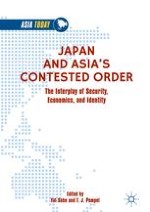2019 | OriginalPaper | Chapter
2. Conceptualizing the Economic-Security-Identity Nexus in East Asia’s Regional Order
Author : Evelyn Goh
Published in: Japan and Asia’s Contested Order
Publisher: Springer Nature Singapore
Activate our intelligent search to find suitable subject content or patents.
Select sections of text to find matching patents with Artificial Intelligence. powered by
Select sections of text to find additional relevant content using AI-assisted search. powered by
